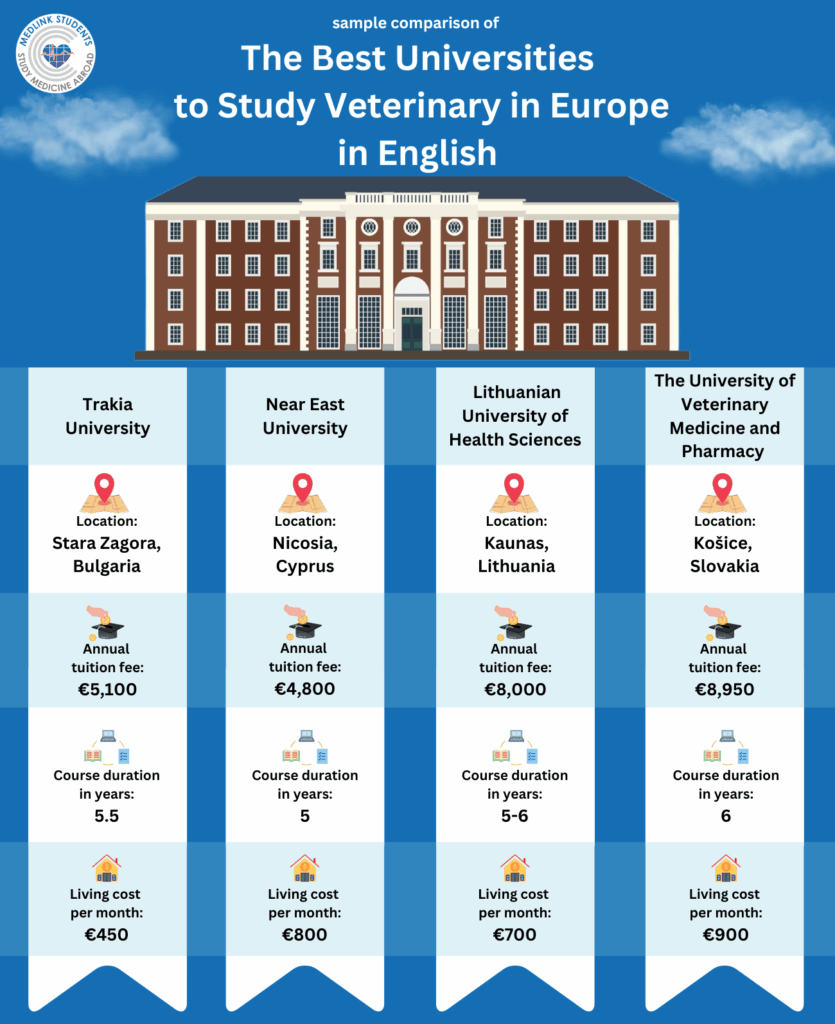

Enquire now and get a FREE assessment of your documents and available options.
We find you the perfect medical school to suit your needs & guarantee your entry.
On-ground support with help from medical students and doctors on campus.
Our doctors will help you register in the UK or other EU countries up graduation.
Everyone prefers to study and work on what they love. So we know what brought you here - the combination of love for animals and medicine. Veterinary medicine is not just a job - it’s a lifestyle.
Every day you will meet new people with whom you share the same passion for the animal kingdom. Being a vet is one of the most exciting jobs you can think of. Your workdays will always be diverse, and every hour spent at the clinic is an adventure. You can treat all kinds of animals - from loveable puppies to exotic, rarely-seen animals, such as reptiles.
What is more, veterinary medicine will give you a chance to get highly paid right after your graduation. Veterinary graduates are among the highest-paid, with an annual average salary of €50,000. As years pass and you gain more experience as a vet, you will also increase your wage multiple times, allowing you to earn more than four times your starting payment.
But your love for animals and willingness to grow as a vet won’t be enough. You will need to find the best university in vet science. Make sure the university is globally recognised, so you can choose where to practise after graduation. European veterinary universities are some of the best that teach veterinary in English.
Suppose you wonder why it is better to study veterinary in English. One of the main reasons is that you will be allowed to practise anywhere you choose after graduation. For example, if you study in your native language but then want to practise in the UK, you must pass a series of exams to prove yourself. We are pretty sure that you don’t want and need this.
Medlink Students will help you find the best university for you according to your needs and income. You won’t have to research every university on your own. We have already done this for you. All you have to do is contact our advisors for FREE, who will help you find the veterinary school that suits you best.


Every student who chooses the medical path is asking questions like this. And that’s why we are here. To answer your questions and help you overcome any insecurities you have.
Europe gives you many options to choose between countries and cities to live in and study. Most countries have similar living expenses and tuition fees, which are pretty low and affordable. But this doesn’t mean low standards and inadequate education. It’s quite the opposite. The universities are ranked as the best worldwide. They hire well-qualified professionals and invest in the development of the facilities all the time.
Despite the low tuition fees, this is not why students choose Europe. Nowadays, people decide to study abroad based on educational quality, the university’s global recognition, and the facilities. What we can say about European universities is that they have it all.
You will be involved in clerkships and training programmes during your studies in Europe. You will graduate with a worldwide recognised diploma and will have international experience, which is highly valued.


1. Trakia University is located in Stara Zagora, Bulgaria. The city and the medical school make a great combination of an excellent place to live and a high educational level. In Stara Zagora, you will find the country’s largest hospitals and the oldest opera in the Balkans.
The course lasts 5.5 years, and the annual cost is . Your living expenses here will be pretty low compared to other European countries. The university’s accommodation costs between €30 and €40 monthly. Your monthly living will be no more than .
To apply for this university, you will have to pass Biology and Chemistry exams and an English language exam.
2. Near East University is in Nicosia, Cyprus. From this university, you will receive everything a future veterinary doctor needs. The education is at a world-class level. Having the most modern facilities and the best professionals in the area.
The course duration is 5 years, costing per year. Also, you can live in the school’s dormitories, which have a capacity of 5,000 people in more than 20 buildings. It is luxurious and fully furnished with everything you will need. And the price is pretty low, only per year.
If you still think this isn’t one of the best universities, they require NO entrance exam. You will only need an English language certificate.
3. Lithuanian University Of Health Sciences (LMSU) is situated in Kaunas, Lithuania. It’s the second-largest city there. With its castles and historical architecture, it impresses every visitor. Education in Lithuania aims to educate high-skilled professionals in every area of study.
The veterinary science programme here takes 6 years. Tuition fees: for years 1-3, for year 4, and for years 5-6.
If you prefer to live near the university, it has a well-equipped hostel with all the necessary facilities at a reasonable cost of around per month.
4. The University of Veterinary Medicine and Pharmacy in Kosice offers a 6-year course in Veterinary Medicine and a graduate entry pathway allowing you to enter into the 2nd or 3rd year of the undergraduate course.
Applying for the graduate entry route, you will need a bachelor's degree in veterinary science or similar and not older than 6 years.
You will need to pass the biology and chemistry exam for the undergraduate course. Both programmes cost per year.
The medical school also has dormitories close to the faculty, no more than 400-500 meters.


There is nothing much different from the other courses. Except for Near East University, all the others require an entrance exam.
You will need good grades on your high school diploma and a high result on the biology and chemistry exams. But there is no reason to worry about that. Medlink Students will supply you with all the needed materials to prepare.
Also, you will need an English language certificate to prove your English proficiency to study veterinary in that language.
If you already have a Bachelor's Degree in Veterinary Science, you are more than welcome to the University of Veterinary Medicine and Pharmacy in Kosice. They have a graduate entry in Veterinary Medicine in English. The university is located in Kosice, Slovakia.
To apply for this option, you will need a Bachelor's degree in Veterinary Science, animal science or related. The university uses the European Credit Transfer System (ECTS).
If you are already enrolled in a veterinary course, but it didn’t meet your expectations, you came to the right place. Medlink Students can help you find the best veterinary school in Europe and make the transfer process simple and fast. The universities that accept students transfer are:
Generally, the veterinary programmes in Europe in English last between 5 and 6 years. During your studies, you will learn everything about animals. Starting from their biology and anatomy, going through diseases and disorders, and finishing with food hygiene and public health.
Practising any kind of medicine, including veterinary, has its legal and ethical issues, which you will have to know very well. That’s why European universities put this in their curriculums as well.
What is more about the course is that you will also have clinical animal work, training, laboratory, and desk-based work. This means that after you graduate, you will not only know everything theoretically, but you will be able to do it.
Graduating from veterinary medicine in Europe in English enables you to find job opportunities worldwide. You will be welcome to practise in every country without a doubt that your diploma will be recognised.


Becoming a great veterinarian doctor means balancing science, diagnostics, and precise hands-on treatment. Without the right support, reaching this can be overwhelming.
That’s why the Student Success Programme (SSP) pairs you with our team of experienced doctors who can help you navigate complex subjects, improve your clinical skills, and gain confidence in treating all kinds of animals.
From getting accepted to graduating with confidence, we will guide you every step of the way.


The tuition fees vary depending on the university. For example, if you apply to study veterinary at Trakia University (Bulgaria), you will pay €5100 per year, while at the University of Veterinary Medicine and Pharmacy in Kosice, the tuition fees are €8500 per year.
Veterinary courses in Europe take 5 or 6 years to complete.
You can study veterinary medicine in English in Bulgaria, Romania, Poland, Hungary, Cyprus, Slovakia, Lithuania, Estonia, and Croatia. For more information, contact one of our expert advisors.
Yes, after completing your veterinary education in one of the universities we work with, you will be eligible to work everywhere!
Actually, yes, you can! Near East University doesn’t require any entrance exams. You will only need an English exam or a certificate if you have one before.